- Home
- Robert E. Howard
Historical Adventures Page 2
Historical Adventures Read online
Page 2
To the purple country of Prester John
And the walls of Paradise.”
—Chesterton
THE DAYS passed and slowly the giant frame of the Norman knight regained its accustomed vigor. In those days he sat in the chamber with the lapis lazuli dome, or walked in the outer courts where fountains tinkled musically beneath the shade of cherry trees, and soft petals fell in a colorful rain about him. The battle- scarred warrior felt strangely out of place in this setting of exotic luxury but was inclined to rest there and lull the restlessness of his nature for a time. He saw nothing of the city, Jahadur, for the walls about the courts were high, and he presently understood that he was practically a prisoner. He saw only Yulita, the slaves and You-tai. With the thin yellow man he talked much. You-tai was a Cathayan—a member of the race who lived in Greater Cathay, some distance to the south. This empire, Godric soon realized, had given rise to many of the tales of Prester John; it was an ancient, mighty but now loosely knit empire, divided into three kingdoms—the Khitai, the Chin and the Sung. You-tai was learned beyond any man Godric had ever known and he spoke freely.
“The emperor inquires often after your health,” said he, “but I tell you frankly, it were best that you not be presented to him for a time at least. Since your great battle with the Hian bandits, you have captured the fancy of the soldiers, especially old Roogla, the general who loves the princess like his own since he bore her as a babe on his saddle-bow from the ruins of Than when the Naimans raided over the border. Chamu Khan fears anyone the army loves. He fears you might be a spy. He fears most things, does the emperor, even his niece, the princess Yulita.”
“She does not took like the Black Cathayan girls I have seen” commented Godric; “her face is not flat, nor do her eyes slant as much.”
“She has Iranian blood,” answered You-tai. “She is the daughter of a royal Black Cathayan and a Persian woman.”
“I see sadness in her eyes, at times,” said Godric.
“She remembers that she is soon to leave her mountain home,” answered You- tai, eyeing Godric closely. “She is to marry prince Wang Yin of the Chin emperors. Chamu Khan has promised her to him, for he is anxious to gain favor with Cathay. The emperor fears Genghis Khan.”
“Who is Genghis Khan?” Godric asked idly.
“A chief of the Yakka Mongols. He has grown greatly in power for the last decade. His people are nomads—fierce fighters who have so little to live for in their barren deserts that they do not mind dying. Long ago their ancestors, the Hiong-nu, were driven into the Gobi by my ancestors, the Cathayans. They are divided into many tribes and fight against one another, but Genghis Khan seems to be uniting them by conquest. I even hear wild tales that he plans to shake off the liege-ship of Cathay and even make war on his masters. But that is foolish. This small kingdom is different. Though Hia and the Keraits lie between Chamu Khan and the Yakkas, Genghis Khan is a real threat to this mountain empire.
“Black Cathay has grown to be a kingdom apart, pent in the fastness where no strong foe has come against them for ages. They are neither Turks nor Chinese any longer, but constitute a separate nation of their own, with separate traditions. They have never needed any alliances for protection, but now since they have grown soft and degenerate from long years of peace, even Chamu realizes their weaknesses and seeks to ally his house with that of the Chins of Cathay.”
Godric mused a space. “It would seem Jahadur is the key to Black Cathay. These Mongols must first take this city to make sure of their conquests. No doubt the walls throng with archers and spearmen?”
You-tai spread his hands helplessly. “No man knows the mind of Chamu Khan. There are scarce fifteen hundred warriors in the city. Chamu has even sent our strongest detachment—a troop of hard-riding western Turks—to another part of the empire. Why, no one knows. I beg you, stir not from the court until I tell you. Chamu Khan deems you a spy of Genghis Khan, I fear, and it were best if he did not send for you.”
But Chamu Khan did call for Godric before many days had drifted by. The emperor gave him audience, not in the great throne room, but in a small chamber where Chamu Khan squatted like a great fat toad on a silken divan attended by a huge black mute with a two-handed scimitar. Godric veiled the contempt in his eyes and answered Chamu Khan’s questions regarding his people and his country with patience. He wondered at the absurdity of most of these questions, and at the emperor’s evident ignorance and stupidity. Old Roogla, the general, a fiercely mustached, barrel-chested savage, was present and he said nothing. But his eyes strayed in comparison from the fat, helpless mass of flesh and arrogance on the cushions to the erect, broad-shouldered figure and hard, scarred face of the Frank. From the corner of his eye Chamu Khan observed this but he was not altogether a fool. He spoke pleasantly to Godric, but the wary Norman, used to dealing with rulers, sensed that dislike was mixed with the khan’s feeling of obligation, and that this dislike was mingled with fear. Chamu asked him suddenly of Genghis Khan and watched him narrowly. The sincerity of the knight’s reply evidently convinced Chamu, for a shadow of relief passed over his fat face. After all, decided Godric, it was but natural that an emperor should be suspicious of a stranger in his realm, especially one of such war-like aspects as the Norman knew himself to be.
At the end of the interview, Chamu fastened a heavy golden chain about Godric’s neck with his own pudgy hands. Then Godric went back to his chamber with the lapis lazuli dome, to the cherry blossoms drifting in gay-colored clouds from the breeze-shaken trees, and to lazy strolls and talks with Yulita.
“It seems strange,” said he abruptly one day, “that you are to leave this land and go to another. Somehow I can not think of you save as a slim girl forever under these blossom-heavy trees, with the dreamy fountains singing and the mountains of Black Cathay rising against the skies.”
She caught her breath and turned away her face as if from an inner hurt.
“There are cherry trees in Cathay,” said she, without looking at him, “and fountains too—and finer palaces than I have ever seen.”
“But there are no such mountains,” returned the knight.
“No,” her voice was low, “there are no such mountains—nor— “
“Nor what?”
“No Frankish knight to save me from bandits,” she laughed suddenly and gayly.
“Nor will there be here, long,” he said somberly. “The time approaches when I must take the trail again. I come of a restless breed and I have dallied here overlong.”
“Whither will you go, oh Godric?” Did she catch her breath suddenly as she spoke?
“Who knows?” In his voice was the ancient bitterness that his heathen Viking ancestors knew. “The world is before me —but not all the world with its shining leagues of sea or sand can quench the hunger that is in me. I must ride—that is all I know. I must ride till the ravens pluck my bones. Perchance I will ride back to tell Montferrat that his dream of an Eastern empire is a bubble that has burst. Perhaps I will ride east again.”
“Not east,” she shook her head. “The ravens are gathering in the east and there is a red flame there that pales the night. Wang Khan and his Keraits have fallen before the riders of Genghis Khan and Hia reels before his onslaught. Black Cathay too, I fear, is doomed, unless the Chins send them aid.”
“Would you care if I fell?” he asked curiously.
Her clear eyes surveyed him.
“Would I care? I would care if a dog died. Surely then I would care if a man who saved my life, fell.”
He shrugged his mighty shoulders. “You are kind. Today I ride. My wounds are long healed. I can lift my sword again. Thanks to your care I am strong as I ever was. This has been paradise— but I come of a restless breed. My dream of a kingdom is shattered and I must ride—somewhere. I have heard much from the slaves and You-tai of this Genghis Khan and his chiefs. Aye, of Subotai and Chepe Noyon. I will lend my sword to him — “
“And fight against my people?” she asked.
His gaze fell before her clear eyes. “‘Twere the deed of a dog,” he muttered. “But what would you have? I am a soldier —I have fought for and against the same men since I rode east. A warrior must pick the winning side. And Genghis Khan, from all accounts, is a born conqueror.”
Her eyes flashed. “The Cathayans will send out an army and crush him. He can not take Jahadur—what do his skinclad herders know of walled cities?”
“We were but a naked horde before Constantinople,” muttered Godric, “but we had hunger to drive us on and the city fell. Genghis and his men are hungry. I have seen men of the same breed. Your people are fat and indolent. Genghis Khan will ride them down like sheep.”
“And you will aid him,” she blazed.
“War is a man’s game,” he said roughly; shame hardened his tone; this slim, clear-eyed girl, so ignorant and innocent of the world’s ways, stirred old dreams of idealistic chivalry in his soul— dreams he thought long lost in the fierce necessity of life. “What do you know of war and men’s perfidy? A warrior must better himself as he may. I am weary of fighting for lost causes and getting only hard blows in return.”
“What if I asked you—begged you?” she breathed, leaning forward.
A sudden surge of madness swept him off his feet.
“For you,” he roared suddenly, like a wounded lion, “I would ride down on the Mongol yurts alone and crush them into the red earth and bring back the heads of Genghis and his khans in a cluster at my saddle-bow!”
She recoiled, gasping before the sudden loosing of his passion, but he caught her in an unconsciously rough embrace. His race loved as they hated, fiercely and violently. He would not have bruised her tender skin for all the gold in Cathay, but his own savagery swept him out of himself.
Then a sudden voice brought him to himself and he released the girl and whirled, ready to battle the whole Black Cathayan army. Old Roogla stood before them, panting.
“My princess,” he gasped; “the courtiers from Greater Cathay—they have just arrived—”
She went white and cold as a statue.
“I am ready, oh Roogla,” she whispered.
“Ready the devil!” roared the old soldier. “Only three of them got through to the gates of Jahadur and they’re bleeding to death! You are not going to Cathay to marry Wang Yin. Not now, at least. And you’ll be lucky if you’re not dragged by the hair to Subotai’s yurt. The hills are swarming with Mongols. They cut the throats of the watchers in the passes, and ambushed the courtiers from Cathay. An hour will bring them—the whole horde of howling devils—to the very gates of Jahadur. Chamu Khan is capering about like a devil with a hornet in his khalat. We can’t send you out now—Genghis holds all the outer passes. The western Turks might give you sanctuary—but we can not reach them. There’s only one thing to do —and that’s hold the city! But with these fat, perfume-scented, wine- bibbing dogs that call themselves soldiery we’ll be lucky if we get to strike a single blow in our defense—”
Yulita turned to Godric with level eyes.
“Genghis Khan is at our gates,” said she. “Go to him.” And turning she walked swiftly into a nearby doorway.
“What did she mean?” asked old Roogla wonderingly.
Godric growled deep in his throat. “Bring my armor and my sword. I go to seek Genghis Khan—but not as she thought.”
Roogla grinned and his beard bristled. He smote Godric a blow that had rendered a lesser man senseless.
“Hai, wolf-brother!” he roared; “we’ll give Genghis a fight yet! We’ll send him back to the desert to lick his wounds if we can only keep three men in the army from fleeing! They can stand behind us and hand us weapons when we break our swords and axes, while we pile up Mongol dead so high that the women on the battlements will look up at them!”
Godric smiled thinly.
* * *
CHAPTER 3
“To grow old cowed in a conquered land,
With the sun itself discrowned,
To see trees crouch and cattle slink—
Death is a better ale to drink,
And by high Death on the fell brink,
That flagon shall go round.”
—Chesterton
GODRIC’S ARMOR had been mended cleverly, he found, the rents in hauberk and helmet fused with such skill that no sign of a gash showed. The knight’s armor was unusually strong, anyway, and of a weight few men could have borne. The blades that had wounded him in the battle of the defiles had hacked through old dents. Now that these were mended, the armor was like new. The heavy mail was reinforced with solid plates of steel on breast, back and shoulders and the sword belt was of joined steel plates a hand’s breadth wide. The helmet, instead of being merely a steel cap with a long nasal, worn over a mail hood, as was the case of most Crusaders, was made with a vizor and fitted firmly into the steel shoulder-pieces. The whole armor showed the trend of the times—chain and scale mail giving way gradually to plate armor.
Godric experienced a fierce resurge of power as he felt the familiar weight of his mail and fingered the worn hilt of his long, two-handed sword. The languorous illusive dreaminess of the past weeks vanished; again he was a conqueror of a race of conquerors. With old Roogla he rode to the main gates, seeing on all hands the terror that had seized the people. Men and women ran distractedly through the streets, crying that the Mongols were upon them; they tied their belongings into bundles, loaded them on donkeys and jerked them off again, shouting reproaches at the soldiers on the walls, who seemed as frightened as the people.
“Cowards!” old Roogla’s beard bristled. “What they need is war to stiffen their thews. Well, they’ve got war now and they’ll have to fight.”
“A man can always run,” answered Godric sardonically.
They came to the outer gates and found a band of soldiery there, handling their pikes and bows nervously. They brightened slightly as Roogla and Godric rode up. The tale of the Norman’s battle with the Hian bandits had lost nothing in the telling. But Godric was surprized to note their fewness.
“Are these all your soldiers?”
Roogla shook his head.
“Most of them are at the Pass of Skulls,” he growled. “It’s the only way a large force of men can approach Jahadur. In the past we’ve held it easily against all comers—but these Mongols are devils. I left enough men here to hold the city against any stray troops that might climb down the cliffs.”
They rode out of the gates and down the winding mountain trail. On one side rose a sheer wall, a thousand feet high. On the other side the cliff fell away three times that distance into a fathomless chasm. A mile’s ride brought them to the Pass of Skulls. Here the trail debouched into a sort of upland plateau, passing between two walls of sheer rock.
A thousand warriors were encamped there, gaudy in their silvered mail, long- toed leather boots and gold-chased weapons. With their peaked helmets with mail drops, their long spears and wide- bladed scimitars, they seemed war-like enough. They were big men, but they were evidently nervous and uncertain.
“By the blood of the devil, Roogla,” snapped Godric, “have you no more soldiers than these?”
“Most of the troops are scattered throughout the empire,” Roogla answered. “I warned Chamu Khan to collect all the warriors in the empire here, but he refused to do so. Why, Erlik alone knows. Well, a man can always die.”
He rose in his saddle and his great voice roared through the hills:
“Men of Black Cathay, you know me of old! But here beside me is one you know only by word of mouth; a chief out of the West who will fight beside you today. Now take heart, and when Genghis comes up the defile, show him Black Cathayans can still die like men!”
“Not so fast,” growled Godric. “This pass looks impregnable to me. May I have a word as to the arranging of the troops?”
Roogla spread his hands. “Assuredly.”
“Then set men to work rebuilding that barricade,” snapped Godric, pointing to the waveri
ng lines of stone, half tumbled down, which spanned the pass.
“Build it high and block that gate. There’ll be no caravans passing through today. I thought you were a soldier; it should have been done long ago. Put your best bowmen behind the first line of stone. Then the spearmen, and the swordsmen and ax-fighters behind the spearmen—”
The long hot day wore on. At last far away sounded the deep rattle of many kettledrums, then a thunder of myriad hoofs. Then up the deep defile and out onto the plateau swept a bizarre and terrible horde. Godric had expected a wild, motley mass of barbarians, like a swarm of locusts without order or system. These men rode in compact formation, of such as he had never before seen; in well ordered ranks, divided into troops of a thousand each.
The tugh, the yak-tail standards, were lifted above them. At the sight of their orderly array and hard-bitten appearance, Godric’s heart sank. These men were used to fierce warfare; they outnumbered his own soldiers by seven times. How could he hope to hold the pass against them even for a little while? Godric swore deeply and fervently and put the hope of survival from him; thereafter during the whole savage fight, his one idea was to do as much damage to the enemy as he possibly could before he died.
Now he stood on the first line of fortifications and gazed curiously at the advancing hosts, seeing stocky, broad-built men mounted on wiry horses, men with square flat faces, devoid of humor or mercy, whose armor was plain stuff of hardened leather, lacquer, or iron plates laced together. With a wry face he noted the short, heavy bows and long arrows. From the look of those bows he knew they would drive shafts through ordinary mail as if it were paper. Their other weapons consisted of spears, short-handled axes, maces and curved sabers, lighter and more easily handled than the huge two-handed scimitars of the Black Cathayans.
Roogla, standing at his shoulder, pointed to a giant riding ahead of the army.
“Subotai,” he growled, “a Uriankhi—from the frozen tundras, with a heart as cold as his native land. He can twist a spear shaft in two between his hands. The tall fop riding beside him is Chepe Noyon; note his silvered mail and heron plumes. And by Erlik, there is Kassar the Strong, sword-bearer to the khan. Well—if Genghis himself is not here now, he soon will be, for he never allows Kassar long out of his sight—the Strong One is a fool, useful only in actual combat.”

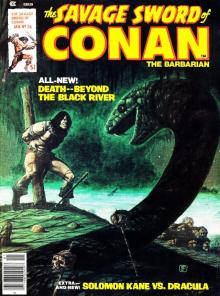 Beyond the Black River
Beyond the Black River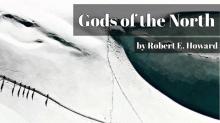 Gods of the North
Gods of the North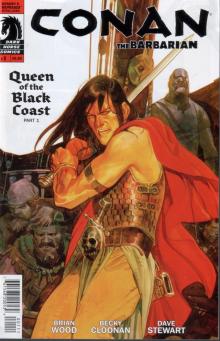 Queen of the Black Coast
Queen of the Black Coast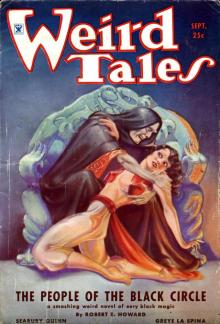 The People of the Black Circle
The People of the Black Circle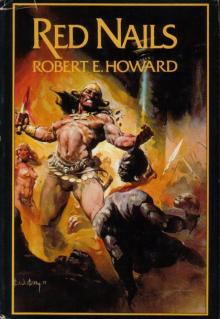 Red Nails
Red Nails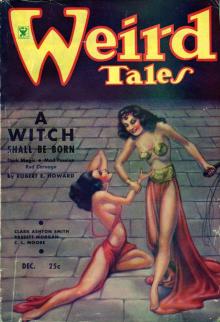 A Witch Shall Be Born
A Witch Shall Be Born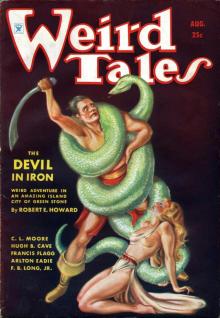 The Devil in Iron
The Devil in Iron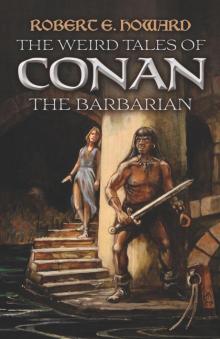 The Weird Tales of Conan the Barbarian
The Weird Tales of Conan the Barbarian The Bloody Crown of Conan
The Bloody Crown of Conan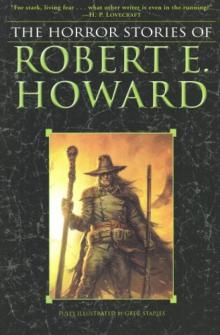 The Horror Stories of Robert E. Howard
The Horror Stories of Robert E. Howard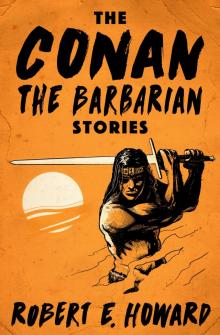 Conan the Conqueror
Conan the Conqueror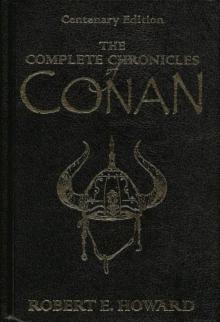 Conan the Barbarian
Conan the Barbarian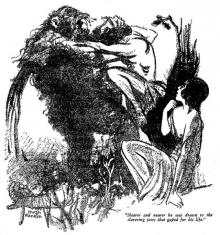 Shadows in the Moonlight
Shadows in the Moonlight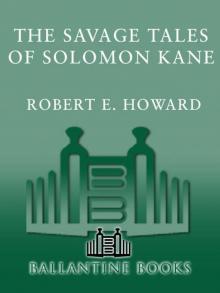 The Savage Tales of Solomon Kane
The Savage Tales of Solomon Kane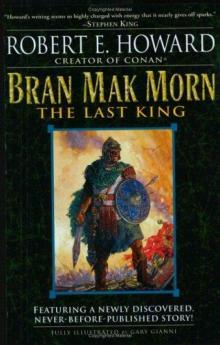 Bran Mak Morn: The Last King
Bran Mak Morn: The Last King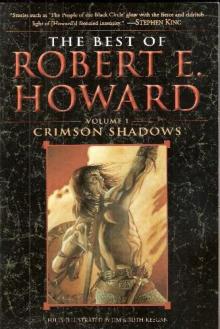 The Best of Robert E. Howard Volume One: Crimson Shadows
The Best of Robert E. Howard Volume One: Crimson Shadows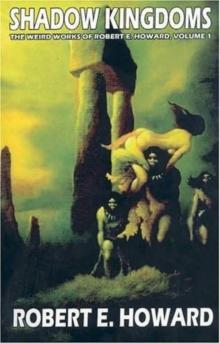 The Best of Robert E. Howard: Crimson Shadows (Volume 1)
The Best of Robert E. Howard: Crimson Shadows (Volume 1)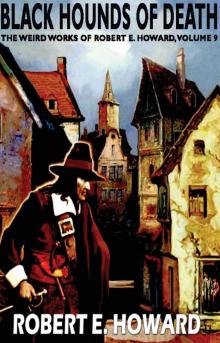 Black Hounds of Death
Black Hounds of Death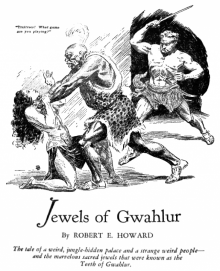 Jewels of Gwahlur
Jewels of Gwahlur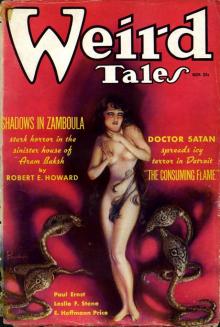 Shadows in Zamboula
Shadows in Zamboula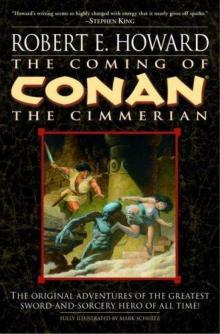 The Coming of Conan the Cimmerian
The Coming of Conan the Cimmerian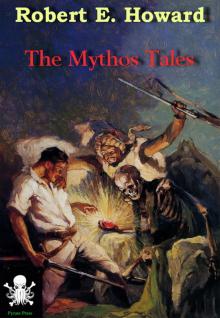 The Mythos Tales
The Mythos Tales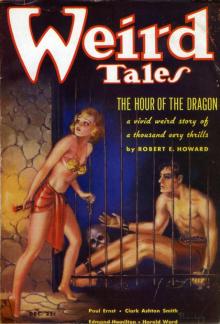 The Hour of the Dragon
The Hour of the Dragon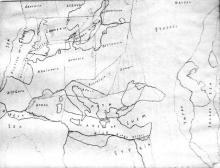 The Hyborian Age
The Hyborian Age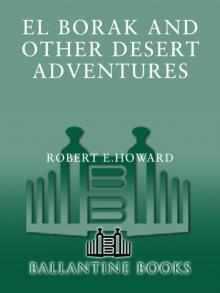 El Borak and Other Desert Adventures
El Borak and Other Desert Adventures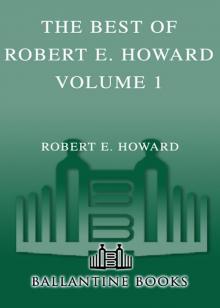 The Best of Robert E. Howard Volume 1 The Best of Robert E. Howard Volume 1
The Best of Robert E. Howard Volume 1 The Best of Robert E. Howard Volume 1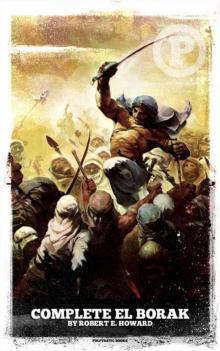 El Borak: The Complete Tales
El Borak: The Complete Tales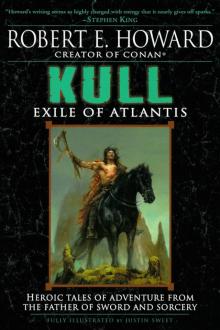 Kull: Exile of Atlantis
Kull: Exile of Atlantis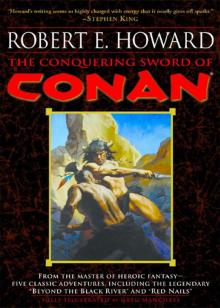 The Conquering Sword of Conan
The Conquering Sword of Conan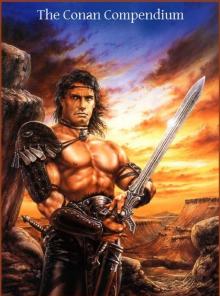 The Conan Compendium
The Conan Compendium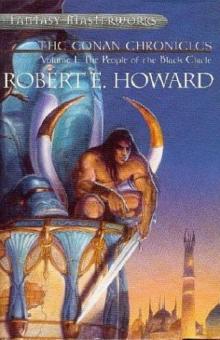 The Conan Chronicles: Volume 1: The People of the Black Circle
The Conan Chronicles: Volume 1: The People of the Black Circle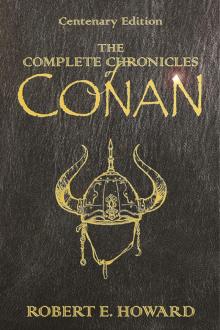 The Complete Chronicles of Conan: Centenary Edition
The Complete Chronicles of Conan: Centenary Edition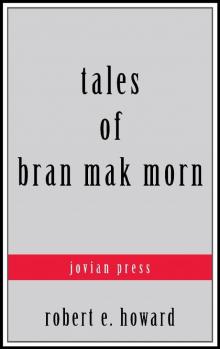 Tales of Bran Mak Morn (Serapis Classics)
Tales of Bran Mak Morn (Serapis Classics)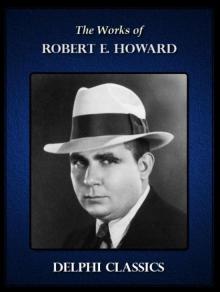 Delphi Works of Robert E. Howard (Illustrated) (Series Four)
Delphi Works of Robert E. Howard (Illustrated) (Series Four)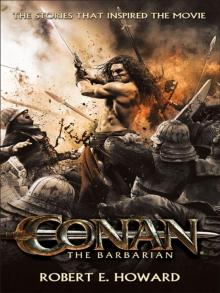 Conan the Barbarian: The Stories That Inspired the Movie
Conan the Barbarian: The Stories That Inspired the Movie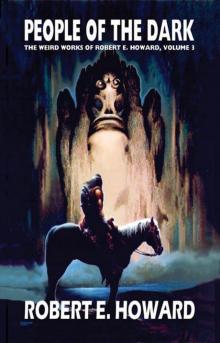 People of the Dark Robert Ervin Howard
People of the Dark Robert Ervin Howard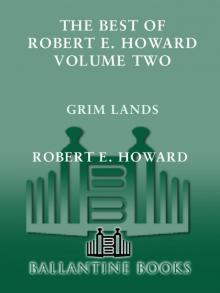 Grim Lands
Grim Lands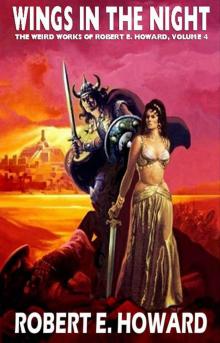 Wings in the Night
Wings in the Night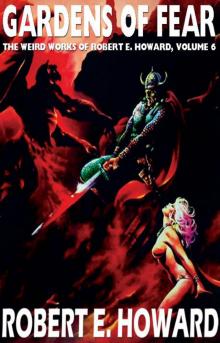 Gardens of Fear
Gardens of Fear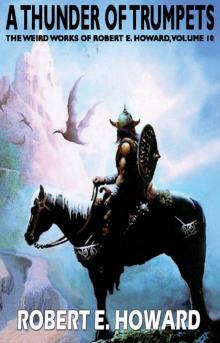 A Thunder of Trumpets
A Thunder of Trumpets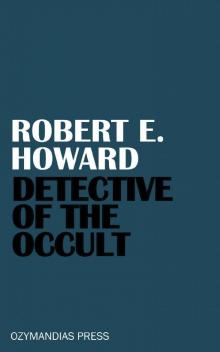 Detective of the Occult
Detective of the Occult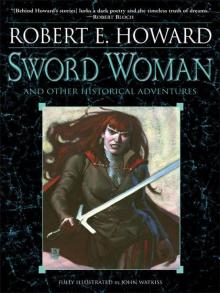 Sword Woman and Other Historical Adventures
Sword Woman and Other Historical Adventures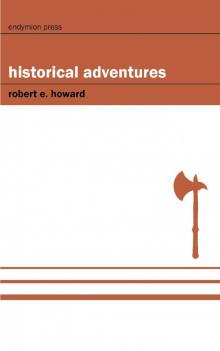 Historical Adventures
Historical Adventures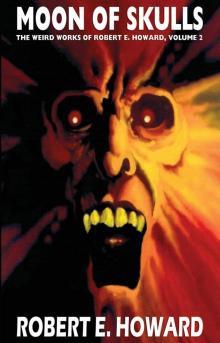 Moon of Skulls
Moon of Skulls The Robert E. Howard Omnibus: 97 Collected Stories
The Robert E. Howard Omnibus: 97 Collected Stories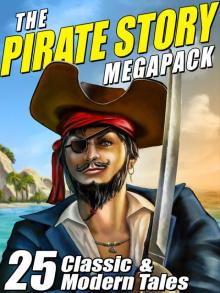 The Pirate Story Megapack: 25 Classic and Modern Tales
The Pirate Story Megapack: 25 Classic and Modern Tales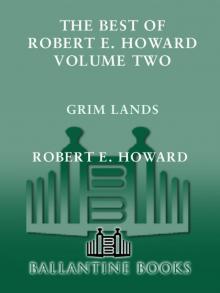 The Best of Robert E. Howard, Volume 2
The Best of Robert E. Howard, Volume 2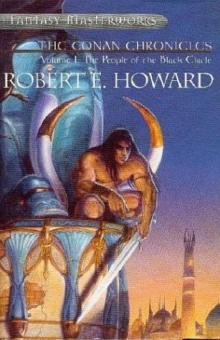 The Conan Chronicles, Vol. 1: The People of the Black Circle
The Conan Chronicles, Vol. 1: The People of the Black Circle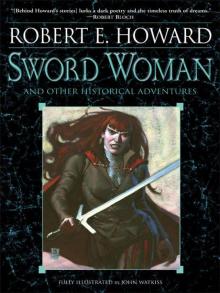 Sword Woman and Other Historical Adventures M
Sword Woman and Other Historical Adventures M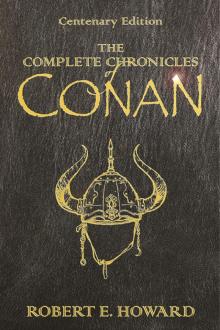 The Complete Chronicles of Conan
The Complete Chronicles of Conan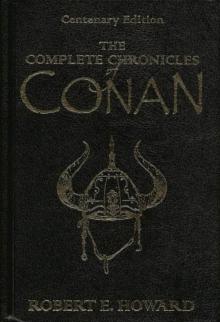 Conan the Barbarian: The Chronicles of Conan (collected short stories)
Conan the Barbarian: The Chronicles of Conan (collected short stories)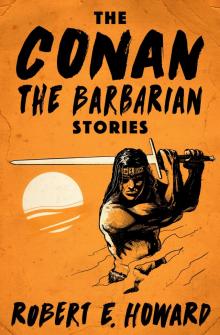 The Conan the Barbarian Stories
The Conan the Barbarian Stories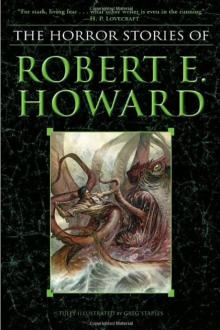 The Best Horror Stories of
The Best Horror Stories of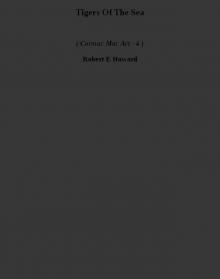 Tigers Of The Sea cma-4
Tigers Of The Sea cma-4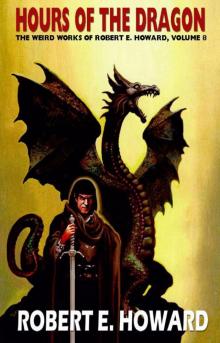 The Hours of the Dragon
The Hours of the Dragon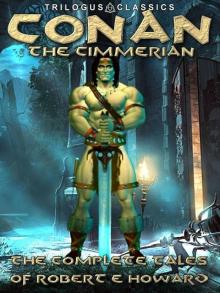 Conan the Cimmerian: The Complete Tales (Trilogus Classics)
Conan the Cimmerian: The Complete Tales (Trilogus Classics)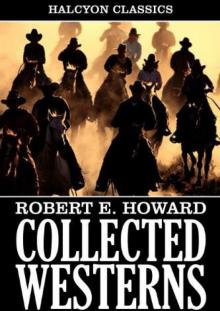 Collected Western Stories of Robert E. Howard (Unexpurgated Edition) (Halcyon Classics)
Collected Western Stories of Robert E. Howard (Unexpurgated Edition) (Halcyon Classics)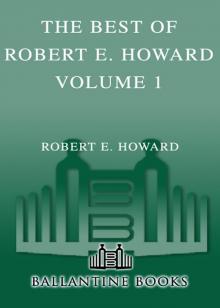 The Best of Robert E. Howard, Volume 1
The Best of Robert E. Howard, Volume 1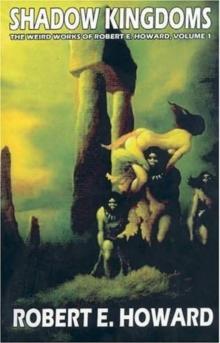 Shadow Kingdoms
Shadow Kingdoms